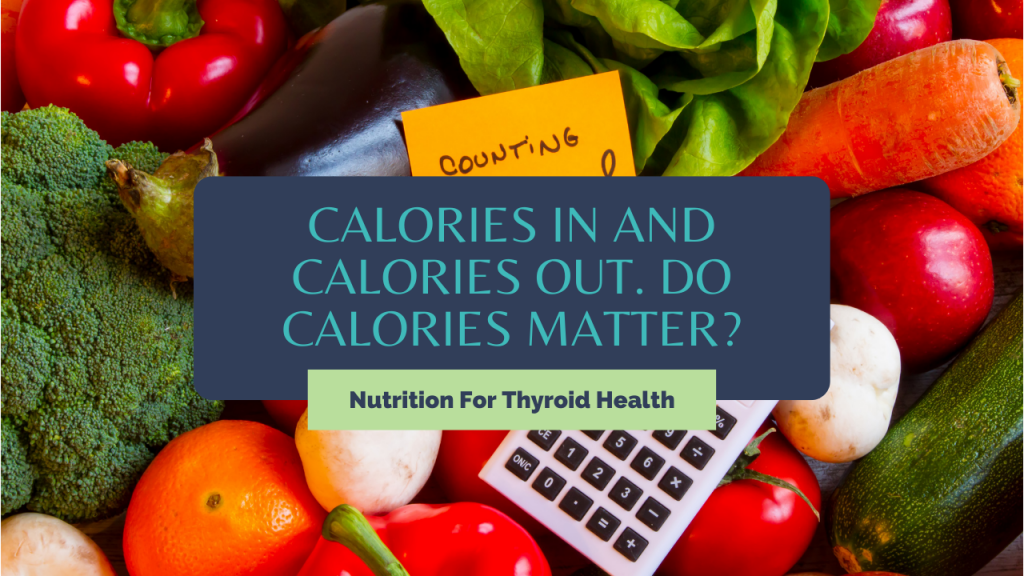Calories In and Calories Out. Do Calories Matter?
Calories in calories out. Doesn’t work for you. Right? Are you someone who struggles with a health condition, chronic fatigue, thyroid dysfunction, a lot of stress in your life or some kind of underlying condition? You don’t know what’s wrong with you and you decide to lose weight.
So, you follow the influencers on TikTok and other places and tell you that all you need to do is reduce your calories, but you feel like that’s not working for you. It’s way more than just calories. I promise.
Calories In and Calories Out Model
The calories in, calories out model is the most basic model of weight loss. The theory behind this model is that if you want to lose weight, you need to consume fewer calories than you burn. If you want to gain weight, you need to consume more calories than you burn.
If you’re eating a very low-calorie diet, you might lose weight in the beginning, but eventually your body will start to hold on to fat because it thinks you’re starving. When you cut calories too much, your body also starts to break down muscle for energy. You might lose weight, but you’ll also lose muscle mass and strength. Plus, when you cut calories and don’t exercise, you can end up with a slower metabolism.
So even if you do lose weight, it’ll be harder to keep it off in the long run. Calorie restriction can also lead to unhealthy behaviors like binge eating. When you finally do eat something, your body is so starved that you end up overeating and then feel guilty about it.
The calorie in, calorie out model is also flawed because it doesn’t take into account the quality of the food you’re eating. your individual metabolism or the energy you expend throughout the day. The calories in, calories out model is a very simplistic way of looking at weight loss and weight gain. It’s also not accurate for everyone.
Are all Calories Created Equal?
500 calories of gummy bears is not the same as 500 calories of broccoli. The gummy bears will spike your blood sugar and insulin levels, whereas the broccoli will give you fiber, vitamins, and minerals.
The quality of the food you’re eating matters more than the quantity (calories). Processed foods, refined carbs, and sugar can all lead to weight gain, even if you’re not eating more calories than you’re burning. These types of foods are less satisfying and can lead to cravings and overeating.
Plus, different people have different metabolisms. Just because someone else can eat 2,000 calories a day and lose weight doesn’t mean you can too. We all have different energy needs based on our age, activity level, and other factors such as a thyroid dysfunction.
So if you’re struggling to lose weight, don’t be discouraged. It’s not just about the calories. There are other factors at play.
I am a Certified Nutrition Specialist (CNS) and I practice functional nutrition which deals with the way food affects you at the cellular level and how the nutrients from food affects your well-being. I offer 1:1 nutrition consultation as well as a health reset membership program that is designed specifically for what you need to do for YOUR body to regain your vitality and feel like yourself again.
3 Steps to Reset Your Health & Crush Your Fatigue
without Crazy Dieting or Beating Yourself up at the Gym
Learn 3 Steps to Reset Your Health & Crush Your Fatigue without Crazy Dieting or Beating Yourself up at the Gym.
This free on-demand workshop was created to support you in improving your health and finally getting your energy back on track.
Let’s Connect!
It’s time to say goodbye to fatigue and hello to a full and vibrant life!
Join me over in my Facebook group where we are talking all about how to take back control of your health!
Be sure to follow me on my Facebook, TikTok, Instagram and Pinterest for tips and tricks on how to use nutrition to live your very best life!
Calories In and Calories Out. Do Calories Matter? Read More »

